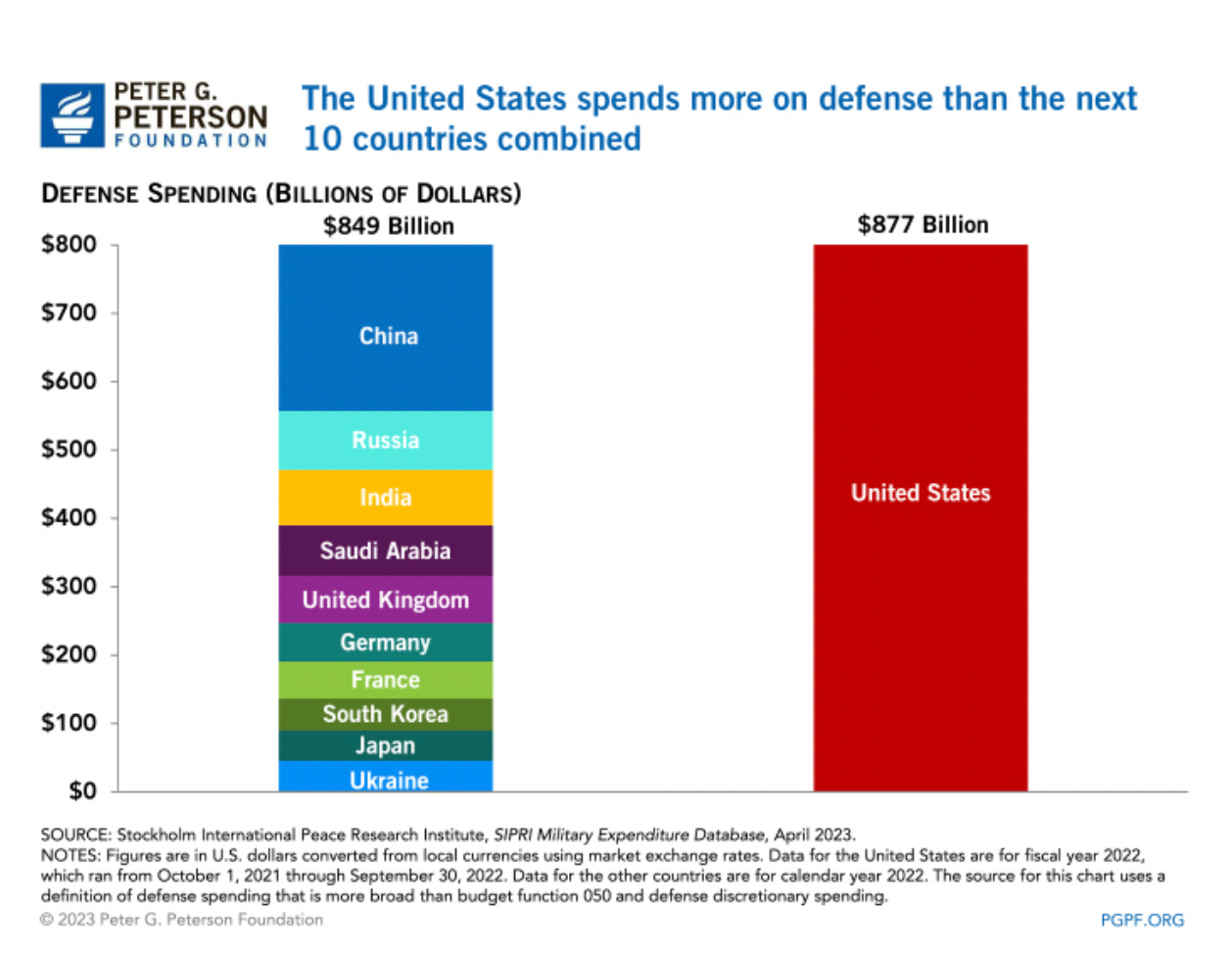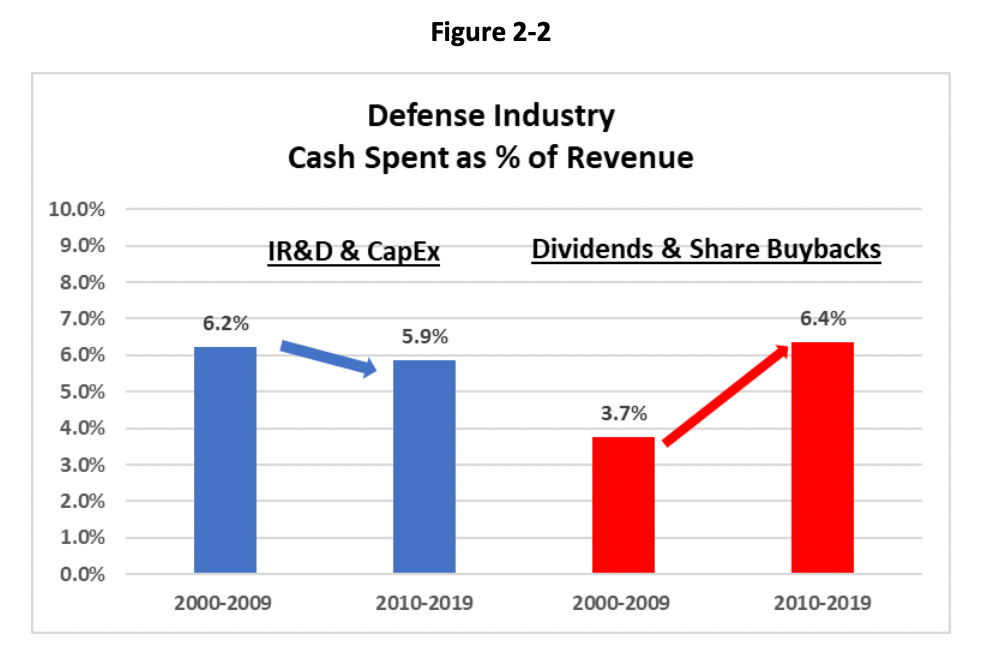There is always more money for defense contractors
In 2023, Republicans and Democrats are deeply divided on nearly every significant policy issue. But there is an exception to the rule. Both parties can always agree on sending more money to defense contractors.
The agreement between President Joe Biden and House Speaker Kevin McCarthy (R-CA) to raise the debt limit for two years, if approved by the House and Senate, will avert a potential economic catastrophe. Biden started off demanding a "clean" debt limit increase with no extraneous provisions. McCarthy sought deep cuts in domestic discretionary spending and large increases in military spending in exchange for raising the debt limit.
The compromise, reached Sunday, includes a small decrease in domestic discretionary spending and a record $886 billion for defense, a 3.3% increase over the current year. The money allocated for the defense budget is exactly what Biden requested in the 2024 budget. Notably, about half of that money will go to defense contractors.
In 2015, the United States spent $585 billion on its military. The United States has added more than $300 billion in military spending in less than a decade. (Had military spending kept pace with inflation, military spending would still be less than $700 billion annually.) Biden has added nearly $150 billion to the military budget since 2021, the last budget approved by President Trump. The budget of the Pentagon now exceeds "the budgets for the next ten largest cabinet agencies combined." In 2020, Lockheed Martin received $75 billion in government contracts, more than 1.5 times the budget of the entire State Department.
Last year, the United States spent more on its military than the next 10 highest-spending countries combined:
Some defense hawks dismiss this statistic, claiming that countries like China have more "purchasing power." This only underscores the waste and abuse endemic to America's military-industrial complex.
This military spending increase has occurred even as Biden ended the war in Afghanistan, the military's longest-running and most costly foreign intervention. But there is no "peace dividend." Each year, the costs go up dramatically.
What would be the impact on national security if the military budget was $786 billion next year instead of $886 billion? This is a discussion that does not regularly occur among top national political leaders. Instead, support for more military spending is equated with "supporting the troops" and "keeping people safe." Any suggestion that spending could be trimmed is derided as naive and dangerous.
Military contractors have taken advantage of the political dynamics. According to a 60 Minutes investigation that aired earlier this month, "[m]ilitary contractors overcharge the Pentagon on almost everything the Department of Defense [DoD] buys each year." The problem has its roots in the early 1990s "when the Pentagon, looking to reduce costs, urged defense companies to merge and 51 major contractors consolidated to five giants." That means there was no longer much competition for defense contracts. The Defense Department has few options today, and the defense contractors know it.
The issue became more severe "in the early 2000s when the Pentagon, in another cost-saving move, cut 130,000 employees whose jobs were to negotiate and oversee defense contracts." Today the Pentagon, with limited oversight capacity, relies "on the companies to do what [is] in the best interests of the war fighters and the taxpayers." It is not working out well.
The skyrocketing cost of one missile
In 1991, when there was genuine competition for military contracts, the cost of one shoulder-fired stinger missile was $25,000. Now, defense contractor Raytheon is the sole supplier. The missiles are in high demand because they are being sent to Ukraine to fend off invading Russian forces. The current cost for one missle is $400,000. Even accounting for inflation, that is a seven-fold increase.
Separately, the Pentagon "caught Raytheon making what they called 'unacceptable profits' from the Patriot missile defense system by dramatically exaggerating the cost and hours it took to build the radar and ground equipment."
Meanwhile, Lockheed Martin and Boeing were found to be "grossly overcharging the Pentagon and U.S. allies by hundreds of millions of dollars for the Patriot's PAC-3 missiles." The profit margin for the weapons approached 40%.
A Department of Defense report released last month concluded that the five major defense contractors "generate substantial amounts of cash beyond their needs for operations or capital investment." These firms "generate total returns to shareholders well in excess of what one might expect given their relative low risk to investors." Further, the companies are now spending more money on stock buybacks to increase their share prices than on research & development and capital expenditures.
None of this has prompted any reconsideration of the wisdom of simply plowing more money into the Defense Department.
Rigging the game
Over the last 20 years, the defense industry has "spent $2.5 billion on lobbying." During that period, defense contractors employed an average of 700 lobbyists — more than one lobbyist for every member of Congress.
All this spending on lobbying has enabled military contractors to alter laws and regulations for their own benefit. For example, "if a company is selling something that is considered a commercial item, they don’t have to give the Pentagon the same information about cost and pricing than they would if it was a noncommercial." The idea is "if you are selling something that is commercial, you can assume that it is competitively priced." But the defense industry has successfully lobbied Congress "to redefine what commercial means," allowing non-commercial items (things that are not sold to the public) to be designated as commercial.
According to a recent Pentagon report, Boeing refused to provide cost data for 10,659 replacement parts between from October 2020 through September 2021. In a May 24 letter, Senator Elizabeth Warren (D-MA) and Congressman John Garamendi (D-CA), call Boeing's refusal "to provide basic information to DoD contracting officers are absurd and unacceptable." Without data on underlying costs, it is impossible "to determine if [Boeing's] prices are fair and reasonable."
Another issue is that while the government pays defense contractors to design and build complex weapons systems like the F-35 Joint Strike Fighter program, the contractors retain "control of the design and repair data, the proprietary information needed to fix and upgrade the plane." So if the planes break, which they often do, the military cannot fix the issue. Instead, it must pay the defense contractor again. Support and maintenance of the F-35 "could end up costing taxpayers $1.3 trillion."





I am so glad you wrote this piece. It is about time someone highlighted the defense industry’s abuse of our government, just like the oil companies who refused President Biden’s request to keep prices low during the pandemic and instead pulled in record profits. So much for”patriotism “!
1 Alabama Senator can hold up unlimited number of promotions in the military because - abortion. But no amount of "legislators" can stop out of control military spending for any reason. We are screwed.